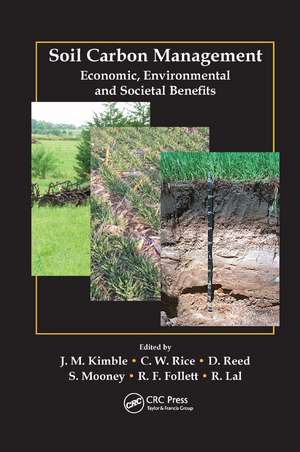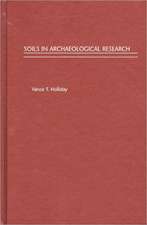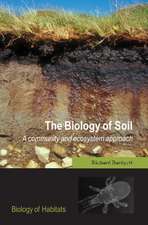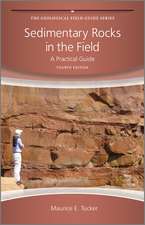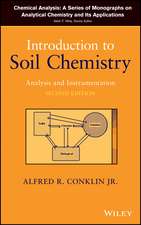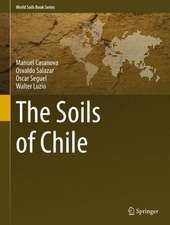Soil Carbon Management: Economic, Environmental and Societal Benefits
Editat de John M. Kimble, Charles W. Rice, Debbie Reed, Sian Mooney, Ronald F. Follett, Rattan Lalen Limba Engleză Paperback – 19 sep 2019
A Different Way of Examining Soil C Management
This unique resource provides a new conceptual framework to develop policies for managing and enhancing soil C and presents new approaches to achieve positive environmental outcomes. In each chapter, the book poses a problem or set of problems and then describes how effective soil C management can help to solve these challenges, listing the multiple benefits that arise from these practices. The book addresses specific problems such as soil erosion and land degradation and evaluates the advantages of soil C sequestration, specifically for policy development purposes. The policies discussed can be tailored to meet regional and local needs and constraints. The book also explains how to achieve an ideal environment by applying beneficial practices for farming and land management.
A Plan for the Future
Illustrating how to conserve and preserve soil quality for future generations and detailing how to restore the ecological functions of soil, this book will aid in the formulation of future agricultural policies that sustain food and fuel needs and have long-lasting, positive environmental impacts.
| Toate formatele și edițiile | Preț | Express |
|---|---|---|
| Paperback (1) | 489.26 lei 43-57 zile | |
| CRC Press – 19 sep 2019 | 489.26 lei 43-57 zile | |
| Hardback (1) | 1276.49 lei 43-57 zile | |
| CRC Press – 21 mai 2007 | 1276.49 lei 43-57 zile |
Preț: 489.26 lei
Preț vechi: 575.60 lei
-15% Nou
Puncte Express: 734
Preț estimativ în valută:
93.62€ • 97.99$ • 77.92£
93.62€ • 97.99$ • 77.92£
Carte tipărită la comandă
Livrare economică 31 martie-14 aprilie
Preluare comenzi: 021 569.72.76
Specificații
ISBN-13: 9780367389109
ISBN-10: 036738910X
Pagini: 280
Dimensiuni: 156 x 234 x 15 mm
Greutate: 0.45 kg
Ediția:1
Editura: CRC Press
Colecția CRC Press
Locul publicării:Boca Raton, United States
ISBN-10: 036738910X
Pagini: 280
Dimensiuni: 156 x 234 x 15 mm
Greutate: 0.45 kg
Ediția:1
Editura: CRC Press
Colecția CRC Press
Locul publicării:Boca Raton, United States
Public țintă
Academic and Professional ReferenceCuprins
Soil Carbon Management: Economic, Environmental, and Societal Benefits. Economic and Societal Benefits of Soil Carbon Management: Policy Implications and Recommendations. On-Farm Benefits of Carbon Management: The Farmers’ Perspectives. Private and Public Values from Soil Carbon Management. Economic and Societal Benefits of Soil Carbon Management: Cropland and Grazing Land Systems. Organic Farming Enhances Soil Carbon and Its Benefits. Benefits of Soil Organic Carbon to Physical, Chemical, and
Biological Properties of Soil. Soil Physical Properties and Erosion. Wetlands and Global Carbon. Wildlife Benefits. Soil Carbon and the Mitigation of the Risks of Flooding. Environmental and Ecological Benefits of Soil Carbon Management: Surface Water Quality. Urban Lands and Carbon Management. Prairies, Savannas, and Forests and Global Carbon Management—The Challenges. Index.
Biological Properties of Soil. Soil Physical Properties and Erosion. Wetlands and Global Carbon. Wildlife Benefits. Soil Carbon and the Mitigation of the Risks of Flooding. Environmental and Ecological Benefits of Soil Carbon Management: Surface Water Quality. Urban Lands and Carbon Management. Prairies, Savannas, and Forests and Global Carbon Management—The Challenges. Index.
Notă biografică
J. M. Kimble, C. W. Rice, D. Reed, S. Mooney, R. F. Follett, R. Lal
Recenzii
"… written by many authors from the USA, covers the problem, how to save soil quality for future generations and how to restore the ecological functions of soil. The authors discuss the new possibilities to develop policies for managing and enhancing soil carbon. … presents new approaches to achieve positive economic, environmental, and social benefits due to good soil carbon management. …The book is divided into three thematically related chapters. …Data presented in this book are shown on clear figures and well-constructed tables. …very carefully prepared and written in clear language. … recommended for a broad audience, including scientists and researchers working in the field of soil science and agronomy. … can help in the formulation of future agricultural policies which consider the soil as a precious resource needed to sustain food, fiber, and fuel needs. Also students, nonscientists, and farmers find this book very useful and inspiring."
—K. Hura and T. Hura in Acta Physiol Plant 2008
"… written by many authors from the USA, covers the problem, how to save soil quality for future generations and how to restore the ecological functions of soil. The authors discuss the new possibilities to develop policies for managing and enhancing soil carbon. … presents new approaches to achieve positive economic, environmental, and social benefits due to good soil carbon management. …The book is divided into three thematically related chapters. …Data presented in this book are shown on clear figures and well-constructed tables. …very carefully prepared and written in clear language. … recommended for a broad audience, including scientists and researchers working in the field of soil science and agronomy. … can help in the formulation of future agricultural policies which consider the soil as a precious resource needed to sustain food, fiber, and fuel needs. Also students, nonscientists, and farmers find this book very useful and inspiring."
—K. Hura and T. Hura in Acta Physiol Plant 2008
"Even though the book was targeted to policymakers, the overview of economic and societal benefits should provide researchers and others with valuable information not commonly reported in soil science research publications. I found the summary of federal, state, and private programs fostering soil carbon sequestration especially helpful. Overall, I count this book as yet another valuable addition to the series."
– Curtis J. Dell, in Journal of Environmental Quality, Sept 2008, Vol. 37, No. 5
—K. Hura and T. Hura in Acta Physiol Plant 2008
"… written by many authors from the USA, covers the problem, how to save soil quality for future generations and how to restore the ecological functions of soil. The authors discuss the new possibilities to develop policies for managing and enhancing soil carbon. … presents new approaches to achieve positive economic, environmental, and social benefits due to good soil carbon management. …The book is divided into three thematically related chapters. …Data presented in this book are shown on clear figures and well-constructed tables. …very carefully prepared and written in clear language. … recommended for a broad audience, including scientists and researchers working in the field of soil science and agronomy. … can help in the formulation of future agricultural policies which consider the soil as a precious resource needed to sustain food, fiber, and fuel needs. Also students, nonscientists, and farmers find this book very useful and inspiring."
—K. Hura and T. Hura in Acta Physiol Plant 2008
"Even though the book was targeted to policymakers, the overview of economic and societal benefits should provide researchers and others with valuable information not commonly reported in soil science research publications. I found the summary of federal, state, and private programs fostering soil carbon sequestration especially helpful. Overall, I count this book as yet another valuable addition to the series."
– Curtis J. Dell, in Journal of Environmental Quality, Sept 2008, Vol. 37, No. 5
Descriere
This book highlights the significant economic, environmental, and societal benefits that result from land management practices that maintain or increase soil carbon (C). Each chapter poses a problem or set of problems and then describes how effective soil C management can help to solve these problems. The book explores the potential for agricultural soils to generate soil C credits that could be traded in the broader greenhouse gas credit market, uses an economic metric where possible to determine the broader value of activities that increase soil C sequestration, and describes the benefits of farm programs that reduce soil erosion, improve air and water quality, and mitigate global warming.
